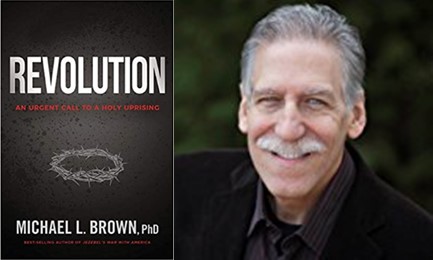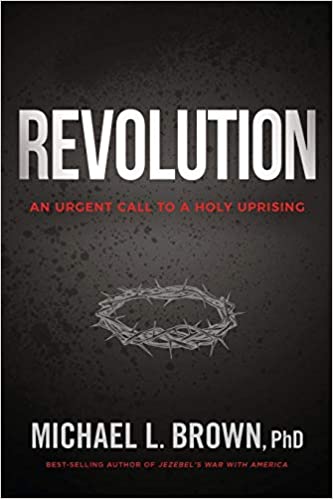Whatever It Takes: an interview with Michael Brown

Pneuma Review speaks with Dr. Michael Brown about his 2020 book Revolution.
PneumaReview.com: Revolution and revival are subjects that you have addressed in a number of your books. What experiences in your life birthed your passion for these things?
Dr. Michael Brown: Although I had been preaching the message of repentance since my first sermon in 1973, and although revival was a consuming theme in my life from the early 1980s, the revolution theme did not become prominent in my life until the late 1990s. To be sure, I had believed in the transforming power of the gospel, even on a national level, in particular during times of spiritual outpouring. And I had also believed that we were all called to lay our lives down for Jesus. But it was only while serving as a leader in the Brownsville Revival that these different themes coalesced around the concept of revolution.

Michael L. Brown, Revolution: An Urgent Call to Holy Uprising (Charisma House, 2020). Preview
As I explain in more depth in Revolution, it was in 1999, after speaking at a major rally in New Jersey, attended by thousands, that I went to my hotel room and decided to watch a documentary about the rise of religious fundamentalism worldwide, beginning in the late 1970s in Iran. Watching the footage from America as Ronald Reagan came to prominence, I was struck by a similar at a major Christian rally where the speaker sounded themes very similar to mine – except he spoke in 1979 and I was speaking in 1999. Yet things had only deteriorated morally in America since then.
At that moment, it struck me that something dramatic had to change, that more of the same would only produce more of the same, that we needed revolutionary change in our churches that would produce a revolutionary change in our society. And as I began to study revolutionary movements in history, trying to understand how cultural came about, for better or for worse, I began to see in a deeper light how revolutionary the words of Jesus really were, from His call to leave everything for His cause to His call to go and change the world with Him (better known as the Great Commission). That’s what led to the writing of this book.
PneumaReview.com: The title of your most recent book is Revolution: An Urgent Call to Holy Uprising. What prompted you to release this book at this time?
Brown: This is actually an updated, revised edition of the book Revolution: The Call to Holy War that came out in 2000 (this, of course, was before 9/11, and the “Holy War” subtitle was inspired by the students in our ministry school, who heard in terms of a gospel call to lay down our lives for a dying world).
At that moment, it struck me that something dramatic had to change, that more of the same would only produce more of the same, that we needed revolutionary change in our churches that would produce a revolutionary change in our society.
Twenty years later, while speaking with editors from Charisma, one of them asked to see the book, after which he reached out to me, asking if I could work on an updated and revised edition to be released immediately. I felt deeply that this was the Lord’s will, since at that very moment, crowds were marching down our city streets proclaiming, “This is revolution!”
I was quite jarred as I wrote, seeing that many of the things I had warned about twenty years earlier had come to pass.
PneumaReview.com: Please describe the characteristics of the revolution that you are calling for in this book.
Brown: Throughout the book, I make very clear that this is a Jesus revolution, not a fleshly, violent revolution of intimidation and anger. It is a revolution based on conformity to the character of Jesus, based on obedience to His radical calling, based on the power of the Spirit, based on the upside down method of the cross. Talk about revolutionary concepts!
A revolution of repentance by the power of the Holy Spirit is needed in the church to bring renewal to a hurting nation.
PneumaReview.com: What are some of the changes that will need to take place in the church before society at large can be changed?
Brown: We can’t just do church as usual, the same way many of us have been doing it for decades. We can’t go on with a spectator Christianity, where people gather together to watch (or, even participate in) a nice religious show. We need to reach the lost and make disciples. We need to produce true Jesus-followers who are joined to Him in loving obedience whether by life or by death. We need to ask how it is that the world has changed us rather than us changing the world. And then we need to be willing to make major changes – not just for the sake of change and certainly not just to be “relevant” – in order to raise up real revolutionaries.
PneumaReview.com: How important is it for the church to have an eternal perspective in order for this radical transformation to take place?
Brown: It is massively important to have that eternal perspective. That’s why I devote chapters in the book to the gods of this age, the gods of material and greed and addiction to sports and entertainment, the things that so deeply distract us, the things that put our whole focus on the here and now. Instead, we must live our lives in the light of eternity, illustrated powerfully in the book not just by stories of martyrdom, but by the theology of martyrdom. With that understanding, even we live to be 100 years old and are financially prosperous, we will live each day in light of forever.
PneumaReview.com: What can individual believers do in order to prepare themselves to be part of this revolution?
Brown: First and foremost, they make a fresh consecration of their lives to the Lord. They count the cost afresh, understanding how extreme the Lord’s demands are, but then they see that this is the path to a meaningful life: “Here I am, Lord! Send me, use me.” But this can only happen when we experience His goodness and grace and love afresh. Otherwise, it will be fear-based or behavior-based. That’s also why there’s an entire chapter in the book devoted to the subject of holiness – but again, this is not presented in legalistic terms but in liberational terms. Holiness to the Lord is the theme of our counterculture revolution.
In short, I would encourage everyone to read the words of Jesus and the apostles afresh and ask, “What if they really meant what they said?”
PneumaReview.com: How can pastors help prepare their people to be involved in this?
Brown: Pastors need to ask themselves what they are building and what they are producing. Certainly, it is impossible to please everyone, and there is more than enough burden on pastors and elders already. That being said, it’s all too easy for leaders to take the easy route, which is often the traditional route, just replicating what they’ve seen over the years, even if the model is not proving effective.
Constant prayer: Whatever it takes and whatever the cost or consequence, Jesus be glorified in my life to the max.
A constant prayer of mine is that, whatever it takes and whatever the cost or consequence, Jesus will be glorified in my life to the max. If we share that heart, I believe God will answer that prayer – and it is revolutionary indeed.
PR
Category: Living the Faith, Winter 2021


